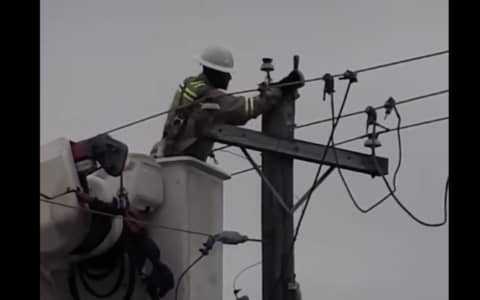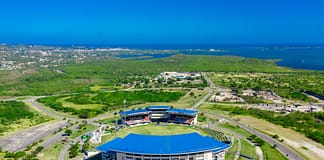
Calls Grow for Underground Wiring After Another Fatal Scaffold Accident
The recent death of a Chinese construction worker at the Booby Alley redevelopment site has triggered renewed calls for Antigua and Barbuda to phase out overhead electricity lines, particularly in densely populated or high-risk areas.
The worker was reportedly electrocuted after a scaffold he was assembling came into contact with a high-tension wire. The accident, which occurred in the Point area of St John’s, has once again highlighted the dangers of overhead wiring on construction sites.
During Thursday’s post-Cabinet media briefing, Chief of Staff Ambassador Lionel Hurst confirmed that the incident is under investigation and that a full report will be submitted to Cabinet. However, the tragedy has added urgency to longstanding discussions about transitioning to underground electrical systems.
“It’s a very expensive undertaking,” Hurst said, noting that while some areas such as Friars Hill Road have been prepared for underground infrastructure, most of the capital remains reliant on overhead wires. He confirmed there were no immediate plans to place the lines near the Booby Alley project underground.
Electricity in Antigua and Barbuda is primarily distributed above ground, a system vulnerable not only to accidents but also to storm-related damage. Advocates for underground wiring argue that it would reduce both safety risks and power outages caused by hurricanes or high winds.
Energy and infrastructure specialist Gerald James told the BBC that while burying power lines offers long-term benefits, the upfront costs are a major obstacle.
“Putting lines underground can cost up to five times more than traditional overhead installations,” James said. “But when you factor in reduced maintenance, improved resilience, and fewer tragedies like this one, it becomes a conversation we can’t afford to delay much longer.”

James added that prioritising underground systems in areas with heavy construction or public activity, such as the city centre and near major redevelopment sites, could be a practical first step.
The Antigua Public Utilities Authority (APUA), responsible for managing the country’s electricity infrastructure, has faced growing public pressure in the wake of the incident. While no formal comment has been issued, Hurst acknowledged that APUA is currently focused on expanding water production and may not have the capacity to pursue large-scale undergrounding at this time.
“We are up to about 9.5 million gallons of water per day, most of it desalinated,” he said. “Resources are tight.”
As the investigation into the fatal accident continues, calls are mounting for a national review of construction safety standards and for the government to revisit its phased underground wiring strategy — before another tragedy occurs.
Advertise with the mоѕt vіѕіtеd nеwѕ ѕіtе іn Antigua!
We offer fully customizable and flexible digital marketing packages.
Contact us at [email protected]

















APUA ELECTRICITY DEPARTMENT
You can equipped with high voltage electric blankets and offer it as a service to the public where there are need for it.
APUA ELECTRICITY DEPARTMENT
You can equipped with high voltage insulation blankets and offer it to the public as a service where it is needed.
Long overdue
I honestly agree imagine in town there are 2 floor building that has balconies in touching distance of a high power electrical wires.
Under ground. Wa. Think about. It. Ok. Think about a village like. Seaview farm. Now tell me. How that go go. When the. People front door. Right be e. Road side and besides. Think of it. So tell me. To how. Apua. Lu. Dig up the road. Just pic it. Ull think that go be any better if them no have the time. Fu change all them buss and old pipe line. A. Fi. Run wire all over the place. In antigua. Just. Left the wire were. Thay are and. Plz. The. Mo eyz you’ll go tek fu. Draw up the plan. Just tek e money fu upgrade APUA Safty gear’s plz and thank u
Comments are closed.